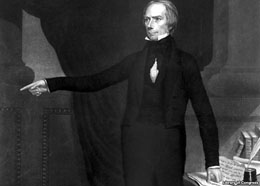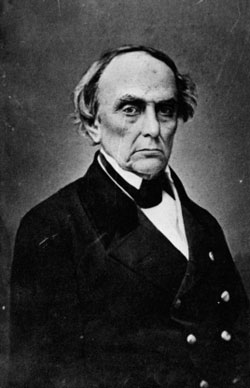VOA慢速英语:卡尔霍恩:南方要求的是纯粹的公正
- 听力原文
- 参考译文
Calhoun: The South Asks for Justice, Simple Justice
From VOA Learning English, welcome to The Making of a Nation, our weeklyprogram of American history for people learning American English. I’m SteveEmber.
During the first half of the 19th century, leaders of the United States could findno answer to the question of slavery. The dispute grew more threatening afterthe war with Mexico in 1849.
Northern states refused to permit slavery in the new territories of Californiaand New Mexico. Southern states declared that they had a constitutional rightto bring slaves into the new lands. The South was ready to secede – to leaveand break up the Union of states.
 |
| A portrait of John C. Calhoun painted by G.P.A. Healy around 1846 |
Then, in 1850, Senator Henry Clay of Kentucky offered a compromise to avoidsecession, and a likely war between the North and South.
He said the Union was permanent and created for all future Americans. Heattacked the South's claim that it had the right to leave. He warned the warthat would follow southern secession would be long and bloody.
One week after Senator Clay spoke, Senator Jefferson Davis of Mississippiexplained his position. He did not say much about Clay's proposedcompromise.
Davis was sure that no good would result from it, not even from stronger lawson the return of escaped slaves. He said these laws would not be enforced instates where people opposed slavery.
He said that what was needed was a change in the North's policy toward theSouth. He said the North must recognize the rights of southerners, especiallythe right to take slave property into U.S. territories.
 |
|
Henry Clay proposed a compromise over the issue of slavery in the United States in 1850 |
Davis said Congress had no right to destroy or limit this right. He admittedthat the old Missouri Compromise of 1820 had limited the right to take slavesinto the territories. He said the 1820 compromise worked -- not becauseCongress passed it, but because the states agreed to it.
Senator Davis said the North was responsible for the growing split in thecountry, because the North was trying to get complete control of the South. He said if these efforts were not stopped, the North some day would bepowerful enough to change the Constitution and end slavery everywhere.Davis warned the South would never accept this change.
Three weeks later, the Senate heard another southern leader, Senator JohnC. Calhoun of South Carolina. For years, Calhoun was the voice of the South. He now was 68 years old and a sick man. He spent the last week inFebruary writing what he believed to be the true position of the South. ManySenators understood it would be his last speech.
On Monday, March 4th, the Senate was crowded when Calhoun entered. Oneby one, friends came to speak to him. The old man's long, gray hair fell to hisshoulders. His face was thin and white. But his eyes were bright and his jawfirm. Calhoun was too weak to read his speech. He asked another senator toread it for him.
Calhoun said that for a long time he had believed the dispute over slavery -- ifnot settled -- would end in disunion. Calhoun said it was clear now toeveryone that the Union was breaking apart, that the ties that had held theNorth and South together were breaking, one by one.
Three churches, once united across the nation, now were split between theNorth and South. The major political parties, he declared, were divided in thesame way. Calhoun said the North was responsible for all this disunitybecause it had destroyed the political balance between the two parts of thecountry.
As the population of the North had grown large, he noted, that part of thecountry seized political and economic control. The North passed tariff bills theSouth opposed. It had filled most of the offices in the federal government. Itclosed the new territories to southern slaveholders. And, said Calhoun, itviciously attacked the southern institution of slavery.
 |
|
This is an undated portrait of American congressman & orator, Daniel Webster (1782-1852). Webster of Massachusetts was accused of ``scarlet infamy'' in 1851 when he backed a North-South compromise that forestalled the dissolution of the Union. (AP Photo) |
The situation was so bad, he said, that the South could not -- with honor andsafety -- remain in the Union. "How can the Union be saved?" he asked. "Not by the compromise proposed by the senator from Kentucky. There is but oneway. A full and final settlement, with justice, of all the questions disputed by the two sections.
"The South asks for justice, simple justice, and less she ought not to take. She has no compromise to offer but the Constitution, and no concession orsurrender to make. She has already surrendered so much that she has littleleft to surrender."
At the end of Calhoun’s speech to the Senate, southern lawmakers crowdedaround the old man, congratulating him. But many of them could not agreewith his demands and the violence of his words. By now, most southernersbelieved that Senator Clay's proposals were a reasonable way to settle thedifference and protect the Union.
Yet Clay worried that northerners might reject his proposals. Many in theNorth felt slavery was wrong. They opposed Clay’s compromise because itmight permit slavery in New Mexico, and because it called for stronger lawson the return of slaves who had escaped to the North. So Clay asked animportant senator from the north to speak in support of his proposals.
Daniel Webster represented the northeastern state ofMassachusetts. Senator Webster believed that slaverywas evil. Yet he believed that national unity was moreimportant. He did not want the nation to divide. He didnot want to see the end of the United States of America.
Webster was 68 years old, as old as Calhoun. Threedays after Calhoun’s speech, Webster spoke to the Senate. His voice wasweaker now. But his words rang with the same strength as years earlier.
"I speak today," he said, "to save the Union. I speak today out of a concernedand troubled heart. I speak for the return of a spirit of unity. I speak for thereturn of that general feeling of agreement which makes the blessings of thisunion so special to us all."
Senator Webster spoke of how he hated slavery. He spoke of his fight againstthe spread of slavery. But he disagreed with those who wanted laws makingslavery illegal in new territories. It would not be wise to pass such laws, hesaid. They would only make the South angry. They would only push the Southaway from the Union.
Then Webster spoke about the things the North and South had done to makeeach other angry.
One, he said, was the failure of the North to return runaway slaves. He saidthe South had good reason to protest. It was a matter of law. The law wascontained in Article Four of the nation’s constitution.
"Every member of every northern legislature," Webster said, "has sworn tosupport the constitution of the United States. And the constitution says thatstates must return runaway slaves to their owners. This part of theconstitution has as much power as any other part. It must be obeyed."
Next, Webster spoke about Abolition societies. These were organizations thatdemanded an end to slavery everywhere in the country.
"I do not think that Abolition societies are useful," Webster said. "At the sametime, I believe that thousands of their members are honest and good citizenswho feel they must do something for liberty. However, their interference withthe South has produced trouble."
As an example, Webster spoke about the state of Virginia. Slavery was legalthere. Webster noted that public opinion in Virginia had been turning againstslavery until Abolitionists angered the people. After that, he said, no one wouldtalk openly against slavery. He said Abolitionists were not ending slavery, buthelping it continue.
Then Webster said the North also had a right to protest about some things theSouth had done. He said the South was wrong to try to take slaves into newAmerican territories. He said attempts to expand slavery violated earlieragreements to limit slavery to areas where it already existed.
Webster said the North also had a right to protest statements by southernleaders about working conditions in the North. Southerners often said thatslaves in the South lived better lives than free workers in the North.
Webster appealed to both sides to forgive each other. He urged them tocome to an agreement. He said the South could never leave the Unionwithout violence.
Webster said the two sides were joined together socially, economically,culturally, and in many other ways. There was no way to divide them. NoCongress, he said, could establish a border between the North and South thateither side would accept.
In general, Webster's speech to the Senate was moderate. He wanted toappeal to reason, not emotion. Yet it was difficult for him to be unemotional. His voice rose as he finished.
"Secession." he called out. "Peaceable secession! Your eyes and mine willnever see that happen. There can be no such thing as peaceable secession. We live under a great constitution. Is it to be melted away by secession, as the snows of a mountain are melted away under the sun?
"Let us not speak of the possibility of secession. Let us not debate an idea sofull of horror. Let us not live with the thought of such darkness. Instead, let uscome out into the light of day. Let us enjoy the fresh air of liberty and union."
Northern Abolitionists quickly criticized Daniel Webster's speech. They calledhim a traitor. But most people of the North accepted Webster's appeal forcompromise. His speech cooled the debate that threatened a complete breakbetween the North and South.
Yet the speech was not the end of the debate. The Senate’s final decision on the Compromise of 1850 will be our story next week.
I’m Steve Ember, inviting you to join us next time for The Making of a Nation —American history from VOA Learning English.
十九世纪上半叶,美国政治领袖在蓄奴还是废奴问题上寻找答案。1849年美墨战争结束后,这一争议引起的威胁日益加深。
北方州拒绝让奴隶进入新增领土加利福尼亚和新墨西哥。南方州则宣称,根据宪法,他们有权把奴隶带来那里去。南方威胁说,如果无法解决纠纷,就会脱离联邦,让国家分裂。
关键时刻,肯塔基州的联邦参议员亨利·克莱挺身而出。克莱1850年提出了一项妥协方案,努力避免国家分裂和内战的爆发。
克莱说,美国联邦是永久的,是为子孙后代建立的。他指责南方无权脱离联邦,并警告说,如果南方脱离联邦,势必会爆发一场持久和伤亡惨重的战争。
克莱的妥协方案遭到了南北双方极端势力和总统泰勒的反对。泰勒原本希望韦伯斯特参议员、克莱参议员和其他辉格党领袖支持他所提出的让加利福尼亚成为美国一个州的计划,但是没有人理会他的提议,让他的自尊心深受伤害。
泰勒总统的首席顾问,纽约州联邦参议员苏厄德也反对克莱的提案。苏厄德坚决反对蓄奴,认为不应该在这个问题上做出任何妥协。
克莱讲话一周后,密西西比州的联邦参议员杰斐逊·戴维斯阐明了自己的立场。他没有过多谈及克莱的妥协方案。戴维斯坚信,这一方案对南方没有多少好处,即便是加强遣返逃亡奴隶的法律,因为这样的法律在自由州很难得到落实。
戴维斯参议员说,真正需要的,是北方改变对南方的政策。他说,北方必需承认南方的权利,尤其是南方人让自己的奴隶进入美国领地的权利。
戴维斯说,国会无权取消或是限制这种权利。他承认,1820年密苏里协定对新增领土上蓄奴的权利设立了限制,但表示,1820年密苏里协定奏效,不是因为国会的批准,而是因为各州的接受。
戴维斯参议员说,国家日益分裂是北方的责任,因为他们试图彻底控制南方。他说,如果不制止这种发展趋势的话,有朝一日,北方的势力就会强大到改变宪法,彻底取消奴隶制度。戴维斯警告说,这是南方绝对不会接受的。
三个星期后,另外一位南方领袖,南卡罗来纳州的联邦参议员卡尔霍恩在参议院发表讲话。多年来,卡尔霍恩一直是南方利益的代言人。当时,卡尔霍恩已经68岁了,身患重病,生命只剩下最后一个月了。
卡尔霍恩因为体力不只,没有去听克莱的讲话。他用了二月份的最后一个星期,写下了他所认为的南方各州的真正立场。3月3号星期天,卡尔霍恩宣布,第二天发表演说。
大家都知道,这是他的最后一次演说了。卡尔霍恩走进参议院的时候,里面挤得水泄不通,认识人纷纷前来向他致意。卡尔霍恩银发披肩,面颊消瘦苍白,但是两眼炯炯有神,一脸严肃之情。卡尔霍恩因为虚弱,无法亲自发表演说,只好请梅森参议员代读。
卡尔霍恩说,他一贯认为,如果蓄奴问题引起的争议得不到解决,终将会造成联邦的解体。卡尔霍恩说,如今,每个人都能清楚地看到,联邦正在崩溃,连接南北的纽带一个接一个地崩断。
遍布全国各地的三大教会,如今已经南北分裂,两大政党也形成了南北阵营。卡尔霍恩说,这都是北方的过错,因为他们打破了南北双方的政治平衡。
卡尔霍恩指出,随着北方人口的增加,他们逐渐夺取了政治和经济控制权。北方不顾南方的反对,通过关税法案;占据了联邦政府里的大部分职务;在新增土地上将南方奴隶主拒之门外;北方恶毒地对南方的奴隶制度发起了攻击。
卡尔霍恩认为,目前的局势已经恶化到了南方各州无法体面、安全地留在联邦里的地步。“如何才能挽救联邦?”卡尔霍恩的回答是,“不能依靠肯塔基州参议员提出的妥协方案。出路只有一个,那就是,全面彻底公正地解决双方之间的所有争议。”
卡尔霍恩在发言稿里说,“南方要求的是公正,纯粹的公正,除此以外,一律无法接受。除了遵循宪法,南方不会提出任何妥协,不会做出让步和投降。南方一让再让,已经没有退路。”
接下来,卡尔霍恩列举了南方的一系列要求。他说,北方必需让南方在西部新增土地上享受同等权利,必需遵守遣返逃奴的法律,必需同意修正宪法,让南方和北方之间的政治力量回归平衡,必需停止对奴隶制的攻击。
如果上述要求不能得到满足的话,卡尔霍恩说,那还不如好聚好散。但是如果北方拒绝和平分离,南方就要在投降还是战斗二者间做出选择。卡尔霍恩说,南方知道要怎样做。
卡尔霍恩的讲话结束后,来自南方的议员们把他团团围住,向他表示祝贺,但是很多人对他提出的极端要求和尖刻辞令难以苟同。他的讲话为时过晚了。大多数南方人都觉得,克莱的建议才是解决分歧,保护联邦完整的合理出路。
但是克莱担心,他的妥协提案会受到北方的抵制。很多北方人都觉得,奴隶制是错误的。他们反对妥协,因为妥协可能会让新墨西哥成为蓄奴地区,也因为妥协要求加强对逃亡奴隶的遣返。
克莱向参议院提出妥协方案的八天前,曾去拜访麻萨诸塞州联邦参议员丹尼尔·韦伯斯特。韦伯斯特的一位朋友记录了俩人的会面。他是这样写的:“克莱先生到韦伯斯特先生家拜访,俩人就蓄奴和新增领土引起的问题的最佳解决方式进行了长谈,我听到了谈话的部分内容。”
他说,“克莱大约一小时后离开。韦伯斯特把我叫到身边,对克莱赞誉有加,说他大致同意克莱的看法,觉得克莱的目的崇高,爱国。他说克莱看上去十分虚弱,咳嗽得很厉害,克莱肯定是想在自己的最后一段时间里为国家做点贡献。”
他还说,“韦伯斯特进一步表示,他觉得克莱的计划应该能被北方人和南方的有识之士所接受。他表示,他会支持克莱的提案,推动提案在参议院里获得通过。”
韦伯斯特计划公开支持克莱的提案,但是一直在等待最佳时机。3月7号,也就是卡尔霍恩在参议院发表讲话的三天后,韦伯斯特终于站了出来。韦伯斯特跟卡尔霍恩一样,也是68岁,虽然声音很弱,但是讲话掷地有声,份量不减当年。(备注:仅有部分译文供您参考)
- 频道推荐
- |
- 全站推荐
- 推荐下载
- 网站推荐




















